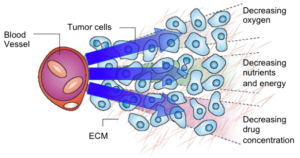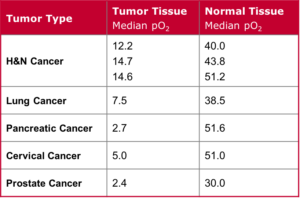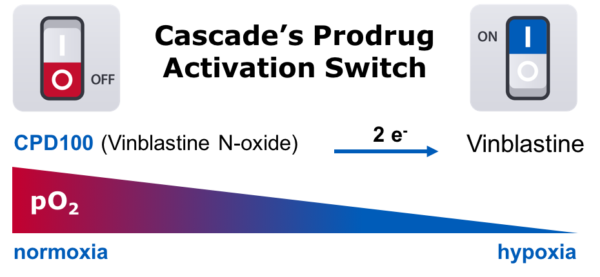Cascade Prodrug is dedicated to furthering the development of its lead candidate, CPD100Li, developed from their hypoxia-activated switch technology to improve the therapeutic options for patients with solid tumor indications
Within the United States, roughly 35% of newly diagnosed cancer patients will be found to have a solid tumor cancer. There are dozens of hypoxic solid tumor cancers that are difficult to treat – including pancreatic, prostate, cervical, non-small cell lung, and head & neck cancers. To date, conventional chemotherapeutics have been unable to effectively treat these cancers.
The primary reason for the limited success of traditional therapies for solid tumors is due to the complex solid tumor microenvironment. Cascade Prodrug actually utilizes these conditions to create a unique, targeted therapy. As solid tumors grow, they develop abnormal vasculatures characterized by low oxygen levels and a lack of nutrients. These slow growing cell populations are hallmarks of solid tumors and are both difficult to reach and difficult to kill by current standards of care.

Solid Tumor Microenvironment

Low oxygen, or hypoxic, tumor microenvironments enhances tumor growth behaviors and supports resident immunosuppressive cells. In addition, the hypoxic microenvironment leads to dysfunction of cytotoxic T cells and promotes tumor mobility. All of these factors have been an impediment to traditional vinca-alkaloid cancer therapies as the microenvironment confers radiotherapy resistance, chemotherapy resistance, and promotes malignant tumor cell phenotypes.
The poor clinical response rates treating solid tumors is attributable to the failure of conventional chemotherapies to completely eradicate these inaccessible, drug-resistant tumor cell populations. Escalating the doses of chemotherapy regimens required to eliminate these inaccessible tumor cells is generally not possible due to severe drug toxicity and adverse side effects.
Cascade Prodrug’s approach is to take advantage of the solid tumor microenvironment and to develop assets that selectively target and activate within hypoxic cell populations. Cascade is currently focused on the development of its lead candidate, CPD100Li, developed from this technology. We believe, once in the clinic, CDP100Li may have advantages compared to current standards of care including improved safety profile, enhanced efficacy, and greater tumor penetration.



